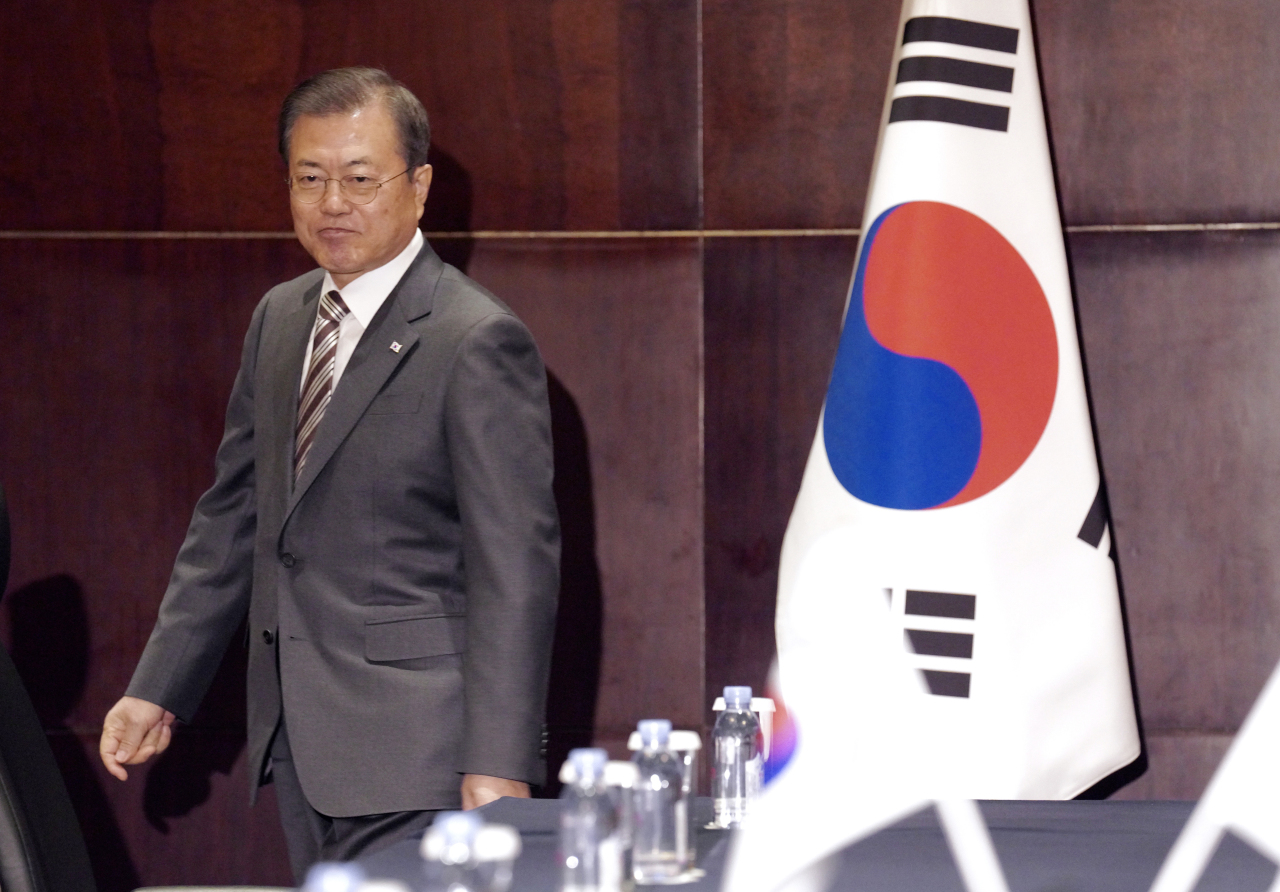Moon: Time for world to act to advance nuclear talks with N. Korea
By YonhapPublished : Dec. 26, 2019 - 14:14
South Korean President Moon Jae-in called on the international community Thursday to take reciprocal actions to maintain the momentum of talks with North Korea and facilitate the peace process.
"More action is needed to achieve peace on the Korean Peninsula," he said in his contribution to Project Syndicate, a global organization carrying op-ed commentaries by prominent figures. "The North Korean nuclear and missile issues have yet to be resolved, and the North is still cautious about engaging fully."
He wrote, "If the North continues to implement denuclearization sincerely, the international community, too, should correspondingly show its efforts."
The president's message came as concern is growing about the fragile Korea peace process amid a prolonged stalemate in denuclearization talks between Pyongyang and Washington.
"More action is needed to achieve peace on the Korean Peninsula," he said in his contribution to Project Syndicate, a global organization carrying op-ed commentaries by prominent figures. "The North Korean nuclear and missile issues have yet to be resolved, and the North is still cautious about engaging fully."
He wrote, "If the North continues to implement denuclearization sincerely, the international community, too, should correspondingly show its efforts."
The president's message came as concern is growing about the fragile Korea peace process amid a prolonged stalemate in denuclearization talks between Pyongyang and Washington.

The Kim Jong-un regime has set a year-end deadline for the Donald Trump administration to offer new incentives for its moratorium on nuclear and major missile testing. Washington, however, says Pyongyang's steps so far are insufficient to prove its seriousness on denuclearization.
The two sides are "demanding that the other take action first," Moon wrote.
He cited a silver lining.
"Fortunately, the shared trust between the US and North Korean leaders remains intact, and their commitment to dialogue is unchanged," he said. "It is time for actions to be taken in response to actions, and the international community should join forces in this effort."
China and Russia recently drafted a UN Security Council resolution on relaxing some of sanctions against Pyongyang. Chances are low that the US will okay it amid the North's renewed saber-rattling.
Keen attention is being paid to Pyongyang's decision ahead of a plenary meeting of the Central Committee of the ruling Workers' Party, expected to be held soon, and leader Kim's New Year's address.
Moon, meanwhile, reaffirmed his administration's three-point principles on the Korean Peninsula affairs: zero tolerance for war, a mutual security guarantee, and co-prosperity.
He reminded the world of his suggestion of transforming the Demilitarized Zone, which bisects the peninsula, into a UN-led global peace zone.
"I believe that if the international community collectively removes the 380,000 landmines buried in the DMZ, and the UN and other international organizations open offices in the zone, these steps can play the role of a security guarantee on the Korean Peninsula," he said in the op-ed piece titled "Peace through a Myriad of Acts."
It would "institutionally and realistically" guarantee North Korea's security and simultaneously bring permanent peace to South Korea, he added.
He emphasized the significance of bringing lasting peace to Korea.
"If the Korean Peninsula were to achieve peace, Korea would be in a position to connect the continent and ocean, and lead efforts to establish a peaceful, prosperous order in Northeast Asia," he said. "The Korean Peninsula serving as such a bridge would benefit ourselves, Northeast Asia, and the Association of Southeast Asian Nations, as well as the global peace order."
He stated again that South Korea aims to promote a "peace-driven economy."
"Reconnecting severed railroads and roads between North and South is the first step toward becoming a bridging nation that leads peace and prosperity in East Asia," Moon said.
He added the peace economy will create a virtuous circle where the two Koreas prosper together through economic cooperation with surrounding countries by ushering in an era when division no longer impedes peace and prosperity, which will in turn solidify peace."
But it can't be done by South Korea alone, which is committed to coordinating with other countries and abiding by the international order, Moon said.
"Working-level negotiations and a third summit between North Korea and the US would be the most critical juncture in the entire process of achieving denuclearization and establishing peace on the Korean Peninsula," he said. "Support from the international community and concerted actions are needed now more than ever ... I am confident that if dialogue and corresponding actions continue, we will need each other more and peace will eventually come."
He recalled Mahatma Gandhi's saying that, "There is no path to peace. Peace is the path." (Yonhap)







![[From the Scene] Monks, Buddhists hail return of remains of Buddhas](http://res.heraldm.com/phpwas/restmb_idxmake.php?idx=644&simg=/content/image/2024/04/19/20240419050617_0.jpg&u=20240419175937)








![[From the Scene] Monks, Buddhists hail return of remains of Buddhas](http://res.heraldm.com/phpwas/restmb_idxmake.php?idx=652&simg=/content/image/2024/04/19/20240419050617_0.jpg&u=20240419175937)

![[KH Explains] Hyundai's full hybrid edge to pay off amid slow transition to pure EVs](http://res.heraldm.com/phpwas/restmb_idxmake.php?idx=652&simg=/content/image/2024/04/18/20240418050645_0.jpg&u=20240419100350)

![[Today’s K-pop] Illit drops debut single remix](http://res.heraldm.com/phpwas/restmb_idxmake.php?idx=642&simg=/content/image/2024/04/19/20240419050612_0.jpg&u=)